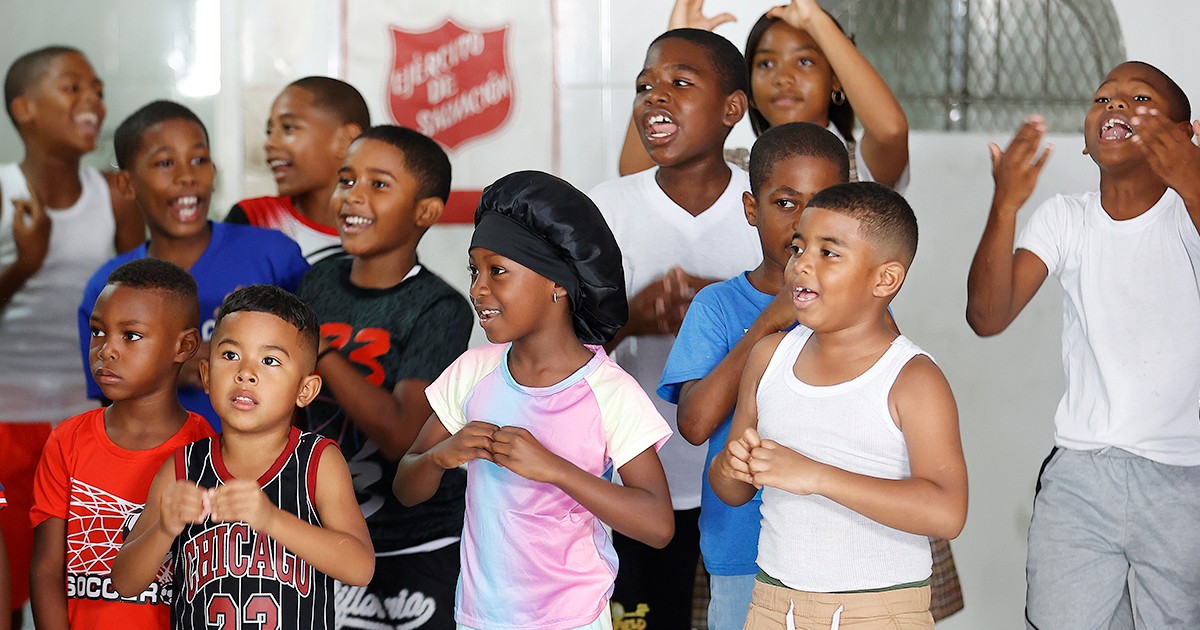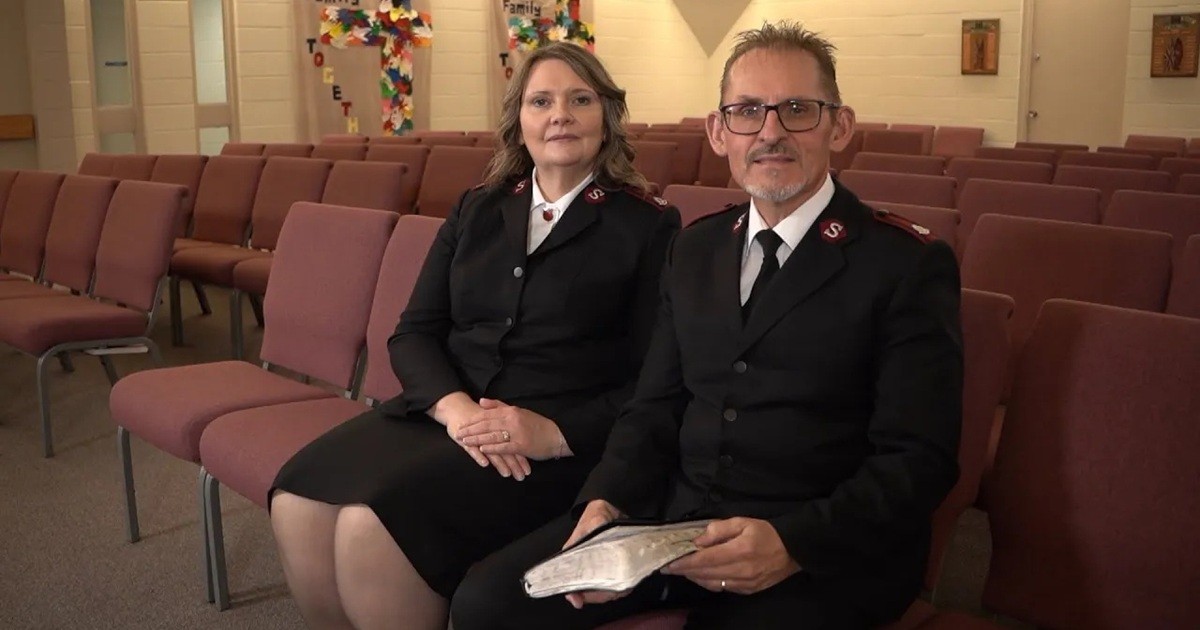 Some people say you have to do inner-city missions to experience the scope of poverty and human suffering. At Winnipeg's Heritage Park Temple (my present corner of suburbia), we've recently uncovered evidence to the contrary.
Some people say you have to do inner-city missions to experience the scope of poverty and human suffering. At Winnipeg's Heritage Park Temple (my present corner of suburbia), we've recently uncovered evidence to the contrary.
It all started a few weeks ago as we began holding children's open airs around our neighbourhood. Our primary goal was to inform our community about our summer day camp program. We knew about the economic strain and the “at risk” kids around us; many with whom we were already connecting. We didn't know about an instance of extreme need, however, that existed just a few blocks away from our corps building.
The location in question is strategically tucked away behind a large shopping complex. Access is not obvious or straightforward. As we arrived on the scene, it was obvious the kinds of challenges with which residents have to deal with: broken doors and windows leading to inadequate security; overgrown walkways; lifting sidewalks; rusty, old abandoned appliances cluttering the landscape; garbage and debris unlikely to be removed.
In my part of suburbia, here was a ghetto. As Webster defines it; “a poor section of a city, inhabited by people of the same social background.” No one had a “better place” up the street. Whether you lived upper level or lower level, it was the same commentary—people just trying to get by on what they had. My heart began to ache as I thought about the comfort of my own home and all the benefits my own children could boast.
Then we met Megan (not her real name), a delightful bundle of energy and enthusiasm wrapped up in a six-year-old body that had probably not seen soap or water for quite some time. Walking barefoot and wearing torn clothing, she was more than willing to show us where all her friends lived around the complex. “This is Max's house,” she said. “His dad is real mean. Don't go knocking there, Lady, if you know what's good for you! This is Sam's house. His mom is sick so we have to play real quiet around her window.”
Within minutes a crowd begins to gather in the centre courtyard as we make our presence known. We bring out our parachute games and bottles of bubbles, and fire up our portable barbecue for free hotdogs. Now even some of the adults get in on the action! Then a climaxing moment that rips at the hearts of us all. As our new friend sits drawing with her piece of crumpled sidewalk chalk, one of our workers pays attention to the dark-rimmed glasses she is wearing. “Megan,” she says, “I really like your glasses!” A sad look suddenly comes over the child's face. “Oh thanks, but they're not mine,” she says. “They belong to my Grandma. She just lets me borrow them so I can see.”
While we heard the child's response in one ear, another voice was speaking. The needs of this community were before us. What could we do as The Salvation Army to make a difference?
The challenges of this neighbourhood were shared subsequently with our congregation the following Sunday. Interestingly, our text for the morning was Revelation 22 where we encounter the realities of entering into the New Jerusalem. Strangely, the author
does not record the presence of any broken windows or lifting sidewalks or accumulated garbage and debris. There is no human struggle. The vision is one of eternal perfection, where water flows as clear as crystal from the throne of God. The tree of life stands before us as evidence that sin's curse has been broken (Rev 22:2). Everyone whose robes have been washed gains access to this holy place (Rev 22:14).
I started wondering what it would take to see my neighbours who lived down the street taking up this new place of residence. What would it take to meet them at the river of life?
This past week I had the privilege of going back to the ghetto. I went to deliver a gift. Megan is going to get her own set of glasses, thanks to the kindness of someone in our congregation. As I shared the news with her mother, she burst into tears. “I don't know what to say,” she said. “I don't have enough words to express my gratitude. No one has ever cared this much about my family.”
That afternoon, grace found its way into the ghetto. The presence of Christ came a few steps closer to a woman who didn't see any hope beyond her daily struggles. The possibility of redemption and new life moved within her reach. Ironically, it would be a new set of glasses that could become her potential stepping stone to the river of life.
The challenge remains for each of us to keep looking at our community through the eyes of Christ. What remains tucked away in our neighborhoods, unseen to the common eye? Where do we find unmet human need? Where can we make a difference? Will we be bold enough to own the part we can play in bringing grace to the ghetto?
Ours is a ministry of extending transformational grace, daring to proclaim the place everyone has at the river of life. There it won't matter what was our previous address; only that we've had eyes to see and hearts to embrace the grace that has been shown to us. Who knows? Maybe a simple pair of eye glasses can become symbolic of the mission that is ours; to bring sight and healing to those who cannot see the light of God because of the overwhelming nature of their struggles. May God give us eyes to see that which has become invisible to a self-absorbed, self-centered society. Truly, we Salvationists are called to see what others don't.
 Major Julie Slous is corps officer at Winnipeg's Heritage Park Temple. She also serves as adjunct faculty at the College for Officer Training. In May 2009, Julie completed her doctoral studies in biblical preaching. Her thesis work centred on “Preaching a Disturbing Gospel─The Homiletic of The Salvation Army for Postmodern Times.” When not studying and writing, personal hobbies include reading, cooking, musical composition and, of course, listening to sermons! Married to Brian, she has three children.
Major Julie Slous is corps officer at Winnipeg's Heritage Park Temple. She also serves as adjunct faculty at the College for Officer Training. In May 2009, Julie completed her doctoral studies in biblical preaching. Her thesis work centred on “Preaching a Disturbing Gospel─The Homiletic of The Salvation Army for Postmodern Times.” When not studying and writing, personal hobbies include reading, cooking, musical composition and, of course, listening to sermons! Married to Brian, she has three children.









Moreover, this article misses a proper definition of what a ghetto is. Webster's does catalogue popular uses of words but sociologists would define a ghetto more complexly than this. Certain factors such as segregation, population density, political marginalization etc. define ghetto:
Hurst, Charles. Social Inequalities: Froms, Causes, and Consequences. 6th Edition.
Joel Blau (1993). The Visible Poor. Oxford University Press US.
Therefore, I think this article should be retitled or formatted not as a suburban apologetic. God's Kingdom is discovered in a multitude of places and opening the urban vs suburban debate is passé.